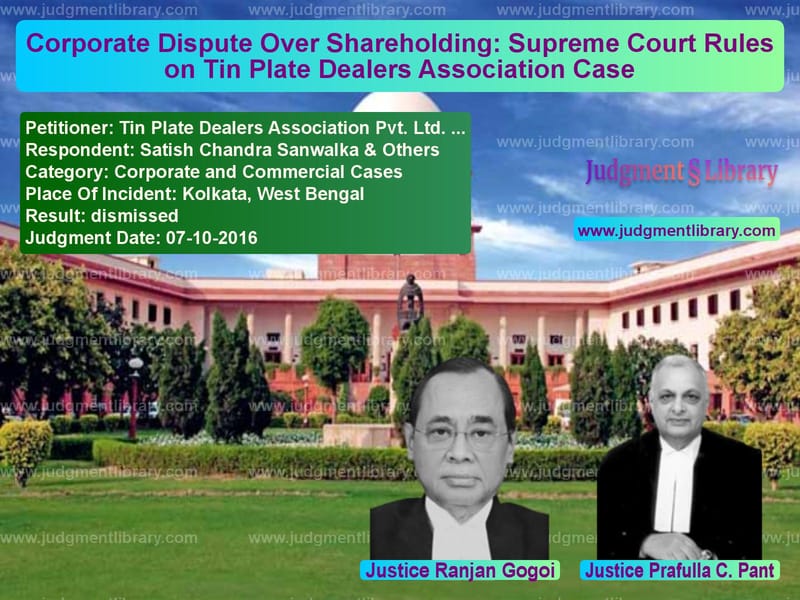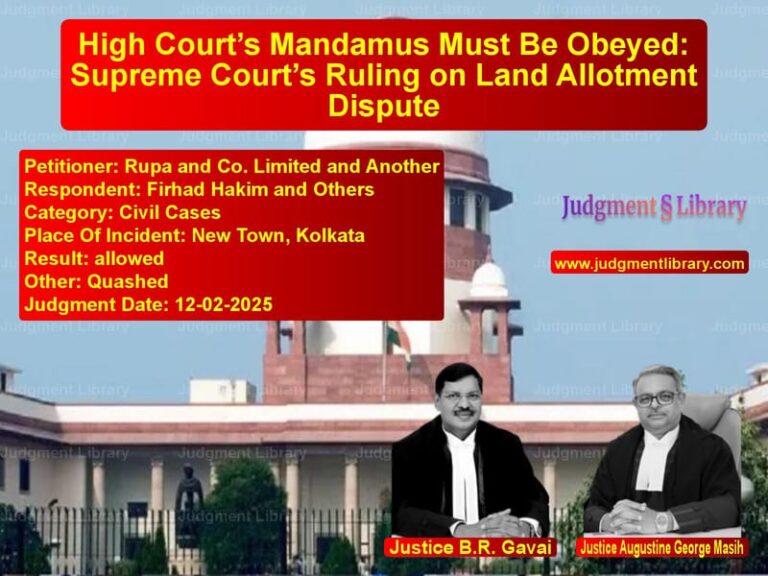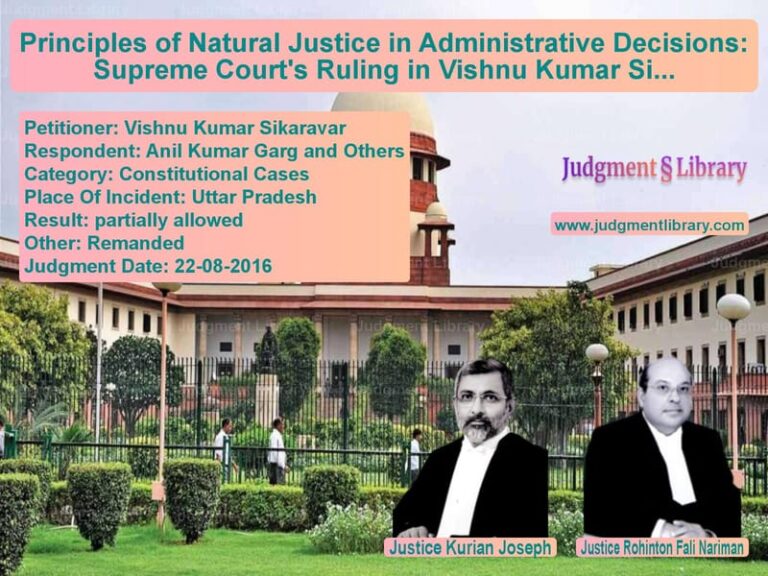Corporate Dispute Over Shareholding: Supreme Court Rules on Tin Plate Dealers Association Case
The Supreme Court of India, in the case of Tin Plate Dealers Association Pvt. Ltd. & Others v. Satish Chandra Sanwalka & Others, delivered a landmark judgment on October 7, 2016, addressing corporate oppression and mismanagement under Sections 397 and 398 of the Companies Act, 1956. The case revolved around a bitter dispute between two factions—the Gupta Group and the Sanwalka Group—over control of Tin Plate Dealers Association Pvt. Ltd.
The Court upheld the Calcutta High Court’s ruling, affirming that the Gupta Group engaged in oppressive actions against the Sanwalka Group by issuing bonus shares without their consent, removing them from the board, and leasing company property in a manner detrimental to shareholder interests. The judgment reiterates the importance of fair corporate governance and the rights of minority shareholders in preventing oppression and mismanagement.
Background of the Case
Tin Plate Dealers Association Pvt. Ltd. was incorporated in 1948 with its registered office in Kolkata. The dispute arose between two factions:
- The Gupta Group, which controlled the company and allegedly manipulated shareholding.
- The Sanwalka Group, which claimed oppression and mismanagement by the Gupta Group.
At the time of incorporation, the company’s authorized capital was Rs. 10 lakh, consisting of 4,000 preference shares and 6,000 ordinary shares of Rs. 100 each. The bone of contention was the Gupta Group’s alleged manipulation of shares to convert the majority-held Sanwalka Group into a minority.
Key Issues in the Dispute
The Sanwalka Group alleged that the Gupta Group engaged in the following acts of oppression:
- Unlawful increase of share capital: The authorized capital was increased from Rs. 10 lakh to Rs. 5 crore without notifying the Sanwalka Group.
- Issue of bonus shares: Bonus shares were issued in a 60:1 ratio exclusively to the Gupta Group, significantly diluting the Sanwalka Group’s shareholding.
- Issuance of additional shares: In February 1996, 25,000 ordinary shares were issued to the Gupta Group without offering them to the Sanwalka Group.
- Forfeiture of Sanwalka Group’s shares: The Gupta Group claimed that shares held by the Sanwalka Group were forfeited due to non-payment of dues.
- Lease of industrial property: A valuable industrial plot in Okhla Industrial Area, New Delhi, was leased to sister concerns under unfavorable terms.
- Removal from board of directors: Two representatives from the Sanwalka Group were removed from the board in 1991.
Arguments Presented
Petitioners’ (Sanwalka Group) Arguments
- The increase in share capital and issuance of bonus shares was done secretly to dilute their stake.
- The issuance of additional shares was illegal as they were not offered an opportunity to subscribe.
- The forfeiture of their shares was unlawful since no valid call notice was issued.
- The lease of the industrial property was executed for personal gain by the Gupta Group at the expense of the company.
- The removal of their representatives from the board was aimed at silencing opposition.
Respondents’ (Gupta Group) Arguments
- The share capital increase was a business decision taken to raise additional capital.
- The Sanwalka Group’s shares were forfeited legally due to non-payment of dues.
- The issuance of additional shares was necessary to maintain liquidity and business operations.
- The lease of the industrial property was essential to prevent forfeiture of the land.
- The removal of Sanwalka Group members from the board was justified due to their non-participation in company affairs.
Supreme Court’s Judgment
The Supreme Court upheld the Calcutta High Court’s ruling, siding with the Sanwalka Group and affirming the findings of the Company Law Board (CLB). The Court made the following key observations:
- On Share Capital Increase: The increase in authorized share capital to Rs. 5 crore was done without notifying the Sanwalka Group, violating corporate governance principles.
- On Bonus Shares: Issuing bonus shares without offering them to all shareholders was oppressive and aimed at reducing the Sanwalka Group’s stake.
- On Issuance of Additional Shares: The issuance of 25,000 additional shares exclusively to the Gupta Group violated corporate fair play.
- On Share Forfeiture: The forfeiture of shares was unlawful as there was no valid proof that a call notice was issued.
- On Lease of Industrial Property: Leasing the company’s only valuable asset to related parties without proper approval was against the interests of shareholders.
- On Board Representation: The removal of Sanwalka Group representatives from the board was done unfairly and without valid reasons.
The Court stated: “The manipulation of shareholding, issuance of bonus shares without offering them to all shareholders, and removing directors without due process constitute acts of oppression. The company’s affairs have been conducted in a manner prejudicial to the interests of minority shareholders.”
Legal Precedents Cited
The Supreme Court referred to several landmark judgments on corporate oppression and mismanagement:
- Needle Industries (India) Ltd. v. Needle Industries Newey (India) Holding Ltd. (1981): Stated that share issuance must be done equitably and fairly.
- Shanti Prasad Jain v. Kalinga Tubes Ltd. (1965): Defined corporate oppression as acts that impose unfair and burdensome conditions on minority shareholders.
- Claude-Lila Parulekar v. Sakal Papers (2005): Held that companies must adhere to their Articles of Association in governance matters.
Impact of the Judgment
The ruling has significant implications for corporate governance:
- Protecting Minority Shareholders: The judgment reinforces the rights of minority shareholders against oppressive majority actions.
- Ensuring Fair Share Issuance: Companies cannot manipulate shareholding to exclude or suppress certain groups.
- Corporate Accountability: The ruling underscores the need for transparency in board decisions and asset management.
Conclusion
The Supreme Court’s decision in Tin Plate Dealers Association Pvt. Ltd. v. Satish Chandra Sanwalka is a landmark ruling that upholds the principles of corporate governance and minority shareholder protection. By affirming that share capital manipulation, unfair allotments, and improper removal of directors constitute oppression, the judgment ensures that corporate management remains fair and transparent.
This ruling serves as a crucial precedent in Indian corporate law, preventing major shareholders from misusing their control to the detriment of minority stakeholders and reinforcing the necessity of equitable corporate governance.
Don’t miss out on the full details! Download the complete judgment in PDF format below and gain valuable insights instantly!
Download Judgment: Tin Plate Dealers As vs Satish Chandra Sanwa Supreme Court of India Judgment Dated 07-10-2016.pdf
Direct Downlaod Judgment: Direct downlaod this Judgment
See all petitions in Company Law
See all petitions in Corporate Governance
See all petitions in Shareholder Disputes
See all petitions in Judgment by Ranjan Gogoi
See all petitions in Judgment by Prafulla C. Pant
See all petitions in dismissed
See all petitions in supreme court of India judgments October 2016
See all petitions in 2016 judgments
See all posts in Corporate and Commercial Cases Category
See all allowed petitions in Corporate and Commercial Cases Category
See all Dismissed petitions in Corporate and Commercial Cases Category
See all partially allowed petitions in Corporate and Commercial Cases Category







